Hallo, eco-friendly viewers. Today’s Planet Earth: Our Loving Home features an interview with Dr. Gordon McBean, a distinguished scientist from the University of Western Ontario in Canada.
Professor McBean received his PhD in Oceanography from the University of British Columbia, Canada.
He has been honored with many distinguished awards, including MSC Patterson Medal, CMOS President’s Prize, EC Jim Bruce Award.
As a Fellow of the Royal Society of Canada, the Canadian Meteorological and Oceanographic Society and the American Meteorological Society, he has also chaired and attended numerous international and national science committees.
We now present Dr. McBean’s discussion the natural hazards caused by climate change.
SUPREME MASTER TV:
Could you give us an overview on climate change?
Prof. McBean:
Well climate first of all is fundamental to our global ecosystems.
The climate is what really determines what types of vegetation we have, where our water flows and in a sense climate is the statistics of weather.
So it gets down to fundamental things like how often do we get a rainstorm? How much evaporation takes place? How do the ocean currents move, which are driven by the winds and the thermal things?
So, when we talk about a change in climate, we’re talking about very fundamental change to the system that determines it; it lays out the basis of our global natural systems, and in a way in which those natural systems both benefit us in terms of delivering of food and those kind of things, as well as the way it, let's say, impacts on us in a hazardous way; for example, floods, droughts, storms.
The reality is that if we look around the globe at the number of natural disasters that happen on a yearly basis and where we define a natural disaster, where a community is really overwhelmed so that they are really not able to cope with it based on their own resources, their own ability and they have to have outside assistance, if we go back over the decades we used to get 50 or 60 of those a year.
We are now getting in total more than 400 per year and over 75, 80 percent of those are related to the climate.
So what most people are seeing around the globe is the horrific impact of changing climate through their natural hazards of storms, floods and droughts that are associated with the climate as it is and as the climate is changing, those kind of events become more pronounced.
SUPREME MASTER TV:
So, what are some of the risks or the effects of climate change?
Prof. McBean:
First of all, heat stress certainly impacts people.
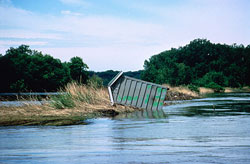 We’re seeing in the statistics more intense rain events. Even in areas where the amount of rainfall will continue to be more or less the same amount in total number of milliliters over the year, a higher fraction of that will come down as deluges.
We’re seeing in the statistics more intense rain events. Even in areas where the amount of rainfall will continue to be more or less the same amount in total number of milliliters over the year, a higher fraction of that will come down as deluges.
And to bring it home to people in Ontario, in August 2005, we had one big rain event in north Toronto. It cost the Canadian insurance companies a half a billion dollars, because it flooded over.
First of all, it wiped out part of Finch Avenue, a big hole in it and the city had to pay for that. So, that wasn't part of what the insurance companies were paying for, but it flooded into and caused sewage backups and water flowing into people’s basements and all kinds of things.
Now, I didn't say that one exactly was caused by climate change. but nonetheless, we will see in the future more of these intense rain events resulting in flash flooding, the overland flow of water; poorly designed sewer systems and things will start backing up, and that causes damage and things.
In the developing countries where they have less capacity, they would be even more impacted, because widely speaking, they’re more, at risk to begin with.
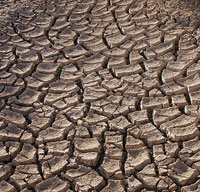
We will have more droughts in areas where droughts already happened. They will be stronger in the sense of the duration and the magnitude of dryness will be larger in the future, particularly in some tropical zones around North Africa, around the Mediterranean, through parts of the Caribbean areas, parts of South Asia where drought is already a problem.
That will become more pronounced. The general expectation is we will not see more hurricanes or typhoons as they are called in most of the world.
But what we will see is the percentage of those that are in the category-four and five-type hurricanes/typhoons will be a higher fraction.
In other words, the hurricanes with high peak wind velocities, high peak precipitation intensities, those fractions will go up.
For every hundred hurricanes, typhoons, a greater fraction of those will be in the high categories again.
HOST:
As a matter of fact, scientists have found that more intense hurricanes have already begun to happen.
Prof. McBean:
Hurricanes need two things: They need warm water. They draw their energy from the ocean. They all form over the ocean. And they actually also have to be away from the equator.
You never actually get a typhoon/hurricane exactly on the equator, and that's due to some dynamics of the way the earth spins.
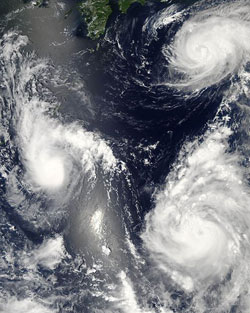
So, you have a zone in say, the North Atlantic, which is say five degrees or so north of the equator and warm, over 26 degrees Celsius is the sort of magic line, and south of the equator, because the oceans are a bit asymmetrical; anyway, you didn't actually have hurricanes in the Southern Atlantic Ocean until we recently had Katrina, which is probably the first real hurricane seen off Brazil and that was a year or so ago.
But as we warm the climate, the warm water expanse will move in both ways away from the equator.
So we will have a larger area in the North Atlantic, from which you can generate hurricanes, and you will have an area in the South Atlantic, which previously was very small, now becoming substantial in creating a zone of hurricanes there.
SUPREME MASTER TV:
So, you say they will go by geography?
Prof. McBean:
In both. In the areas where they have them now, we’ll still get them, and there will be some zones that previously didn't get hurricanes because it wasn't warm enough will start getting them.
Prof. McBean:
We can take action now to prevent the climate of the future from being much worse than it will be if we as humans take action.
And it really needs to be a global collection of activities around the world.
We need to work together between countries, with the developed countries taking the lead, to reduce our emissions of greenhouse gases and at the same time to put in place strategies to reduce the impacts of the hazards, the disasters that are happening as the climate changes.
Prof. McBean:
I think many of you like me have children; I have children and grandchildren. I really worry about them. I worry about the world we are leaving for them and I think because of that we need to work together, so that the planet that the children and grandchildren all around the world will inherit in the years and decades to come is a more sustainable, a more environmentally-friendly kind of environment in which people can enjoy the planet we live on to thrive and live a, let’s say, more enjoyable life.
HOST:
Today’s Planet Earth: Our Loving Home features Dr. Gordon McBean from the University of Western Ontario in Canada and his explanation on the relation between climate change and natural hazards.
SUPREME MASTER TV:
Let's look at the human impact of climate change.
Prof. McBean:
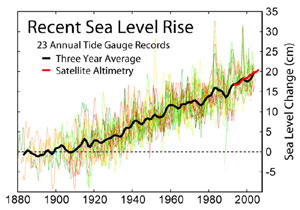
Yes, well, humans are already and always of course, always have been affected by the climate. As it gradually warms and the sea level rises, the rising seas will affect people in coastal zones and there will be more flooding, more erosion of salt into previously fresh-water systems, affecting those.
But when you superimpose, for example, the rising of the sea level with the increased risk of hurricanes, typhoons or storm surges, as we call them, the reality is that many of the people who die in hurricanes don't die directly as a result of the wind or the rain; they die as a result of the huge waves and surge of waters that rush into communities and sweep them away.
Those kinds of events will become more pronounced.
Some countries will build big breakwaters and fortifications and things. And even those are only sustainable to a certain level.
You can't endlessly build a fortification against it; you have to have a system in the end that is quite frankly withdrawn from those areas and that's not possible for many countries.
There aren’t either the financial investment possibilities where you can move people and property and there may not even be other places.
We have a system that is towards very much conglomerations of people and property and investment and things that people need to survive, work, jobs; we create metropolises and many of these are strategically placed, not initially by intention, but by reality in very vulnerable zones.
And so I think we need to be having some kind of way of trying to get, as soon as we can, people to start to rethink these things.
SUPREME MASTER TV:
I know as a grandfather, you are pretty concerned about how our kids will fare with climate change and the effects of climate change.
Prof. McBean:
Yes. We are very much, leaving a very sad legacy for our children and grandchildren who, in a sense, will be inheriting from us a much more unlivable, dangerous climate than we had and that we inherited from our parents and grandparents.
They gave us some of it, but we are adding immensely to this, this load of greenhouse, extra-fossil-based greenhouse gases in the atmosphere and with it a changed climate, such that the opportunities that we’ve had or some of us have had won't be so easily taken in the future
The issue of the relationship between what we do and what we leave for our children and grandchildren, but also international equity.
I have a nice satellite image of the Earth with Africa at the center because in many ways Africa will be the most impacted of the continents.
It is the one where there is least capacity in many areas to take the stress of additional climate change and because it is already under stress, and as you increase the drought conditions both north and south of the equator there will be very large impacts there, as well as parts of Asia.
Part 2
Last week, Dr. McBean discussed in-depth about natural hazards related to global warming. On today’s program, he continues with a look at the growing awareness of governments and the public toward climate change.
SUPREME MASTER TV:
Let's look at the world governments on climate change.
Prof. McBean:
I think it's interesting. There are governments that from the beginning have had a good, strong understanding of this.
Prime Minister Margaret Thatcher of the United Kingdom, who was a conservative, but she was also a chemist.
I never personally ever met her, but my colleagues who do the same kind of thing I was doing then in the United Kingdom, spent hours with her discussing this, going over with her so she could understand, and one result is the United Kingdom has been from the beginning a leader both in support of the science to better understand things, but also in actions on emission reductions and those kind of strategies.
You get in some other countries similar kinds of leaders. And it has been rather interesting in the Canadian scene. We’ve had, up until, well early 2007, if you did an opinion poll of the Canadian population, environment was just one of those down in the bottom group of things.
Maybe one in ten persons identified it as an important issue. And for a variety of factors, storms that happened in Canada, Katrina and other terrible events that happened around the world, maybe some of the IPCC report perhaps by the time we got to mid-late 2007, if you asked Canadians, they said repeatedly in polls that environment was the number one issue on their mind.
It was the biggest issue of concern and within the environment climate change was the number one issue on their mind.
SUPREME MASTER TV:
Right.
Prof. McBean:
So we’re seeing now, in countries, because of the number of climate-related events that have been happening, the statements of the Intergovernmental Panel on Climate Change, I think the awarding of the Nobel Peace Prize is interesting in that context.
All of these things coming together in ways that citizens are saying, and so that in democracies there is now more of an interest in action in Canada, in the United States, certainly at the state level in the United States, in California, in the New England states and some others.
In Europe, it's been there for awhile. Within the European Union as a collectivity, they have been willing to take statements, make judgments, put in place policies to take action on climate change.
SUPREME MASTER TV:
Some scientists are predicting within two years, if we don’t fix, the ice melting in the Arctic.
Prof. McBean:
The question on the ice is one of concern.
What we talk about in the scientific way, what we call tipping points, or irreversible situations, and one of the tipping points is the melting of the Greenland ice sheet in the sense that once you go past a certain point of melting, then it becomes a process that is self-perpetuating.
There is basically nothing you can do about it.
SUPREME MASTER TV:
What is that process?
Prof. McBean:
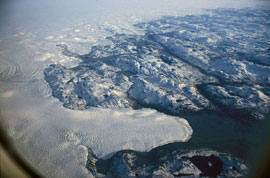
The atmosphere is warmer near the surface where we live and it gets colder as we go aloft. So, think of the Greenland ice sheet as a huge chunk of ice, the top of it, which is a few kilometers high, is high up in the atmosphere where it is cold.
So, we take a process by which we melt the top part of that ice.
When we melt it, we actually lower it down a bit. The top is no longer as high. It’s now in a bit warmer air, so it's got some little more warm air to suck from, and it goes again and again
and again and again, and it's a process that some modelers have argued, and I respect their judgments on this, is that you could with another degree or perhaps two degrees, warming globally translating into what that means over Greenland, result in the starting of this process by which it is a continual melting and then the question is, how fast it melts.
Two and a half years ago or so, I guess, I was contacted by the Norwegian Embassy in Washington and asked if I would go to Washington to speak in the open session in the U.S. Senate buildings so we had a session and the fourth speaker in a series of several was Dr. James Hansen, who was then, and I believe still is the director of one of the U.S. major government research labs, the Goddard Institute for Space Studies.
And Professor Hansen, who is a very outstanding climate scientist modeler stood up and said, first of all he wanted to emphasize he was speaking as a private citizen, not as director of the U.S. government laboratory, which he was, and he then talked about the melting of the Greenland Ice Sheet and in his view, we could be only a degree away from the irreversible starting of this process, and he said, “I don't know how long it will take once it starts, but once it starts, we won't be able to…. there's nothing we can do to stop it and it would result in global sea level rises of six to seven meters.”
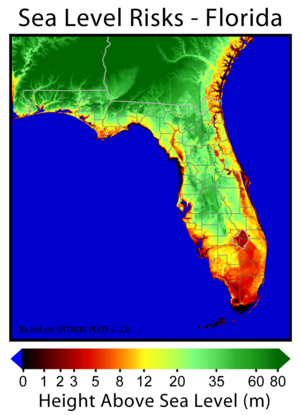
Now, six to seven meters as he noted, roughly, half of Florida is under water. New York City, that's where the Al Gore part of the movie came from, An Inconvenient Truth.
I was in Thailand in November we flew in over into Bangkok Airport. It really showed to me that the level, most of that area from the shoreline of the ocean into the city was basically at sea level and didn't need to have very much rise and that would all be under water.
I know the Mekong Delta and many other parts and countries will disappear with that kind of sea level rise, well before seven meters.
It would start disappearing within a meter or so.
HOST:
You’re watching Planet Earth: Our Loving Home on Supreme Master Television.
He explains how warming waters has the potential to release methane hydrates from the ocean floors and permafrost layers.
Prof. McBean:
The ice is already warm. Warm water under the ice in the Arctic Ocean comes from the North Atlantic. It comes up through, between Iceland and Greenland, east of Iceland, into a depth.
It's traveling underneath the water, that at the surface it’s coming out it goes in, and if that water got warmer, then you could start releasing some of these methyl hydrates.
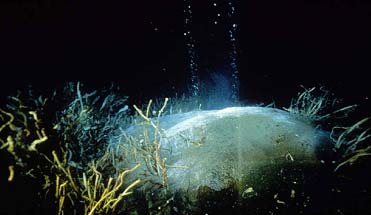
They also said there is the possibility of the methyl hydrates under the Arctic Ocean, but also built into the permafrost of the terrestrial land masses in high-latitude Canada, Russia, etc., that as we warm the permafrost or the ocean that might become volatile, might as it turned from the solid, entrenched form into a gaseous form and bubble up, that as the climate changes, such that a natural-forest system, which in equilibrium is absorbing huge amounts, huge amounts of CO2 , but also giving off roughly the same amount over average, over some time, is that as you made it less productive, it would be then growing less well; it wouldn’t grow as fast, so it would give off, it would not be pulling up as much, but still as it’s dying and decaying off, it will give off as much.
So that the natural systems of forests and peat bogs and other things which had been more or less in equilibrium, as they start getting a climate effect, they will also result in more CO2 coming out into the atmosphere.
HOST:
Forests are known as carbon dioxide sinks for removing CO2 from the atmosphere.
The boreal forests of Canada store as much as 80% of the total carbon in the soils.
Dr. McBean explains clearly how oceans have always been effective carbon sinks as well, however, that will change if ocean waters continue to warm.
Prof. McBean:
A few years ago I was asked in an interview, “What am I looking at now?” This is before the 2007 IPCC report came out and I said, “Everything that I have seen in the credibly important papers since the 2001 assessment of the IPCC has made me more rather than less concerned.”
As people started to understand some of the feedback processes on the greenhouse gas cycles in the atmosphere and the ocean system, as we started to actually put those into climate models in a realistic way as opposed to a very primitive way earlier, what we were seeing is accelerations of the warming and they were happening because, first of all, there are huge natural amounts of carbon dioxide exchanged between the ocean and the atmosphere, and between the atmosphere and the land surface vegetation every year; that is natural.
But right now, for our purpose, supposing in a given year we put six- or seven billion tons of carbon into the atmosphere due to fossil fuel and other processes, this is human direct caused, about a quarter of that is taken up by the oceans, anyway.
The oceans have been part of our savior for some time. It's taking it up naturally.
But what people then were realizing was that as we warmed the system, the oceans would do less of that, because it's actually not the warm water that takes it up, it's the cold water and as we have less cold water, less of that CO2 will be taken up and stored in the deep ocean.
So what we were seeing was in these studies is an increasing risk of large amounts of carbon dioxide coming, not from us directly burning fossil fuel, but as an indirect effect of us doing that, causing the climate to change, causing an interference with natural processes such that they would add CO2, and so you could see in some of these models even with the amount of emissions going down from human activities, the climate’s still warming, and that's what we’re really concerned about.
SUPREME MASTER TV:
What are your final words on climate change and natural hazards?
Prof. McBean:
Some people occasionally ask me how I get up in the morning, because I always talk about all the gloom and doom stuff, and I think that unfortunately, we do have a lot of gloom and doom ahead of us, but I'm also trying to take a more positive view that in the end humanity hopefully will pull together, we will see the wisdom of what we should be doing and the benefits of that in a global way, so that we can, collectively address the issue before it becomes too late.
I don't think it is yet too late. I think there is basis for still taking action, moving together, but it has to be an effort that is motivated and driven by those with the capacity to help the global community.



